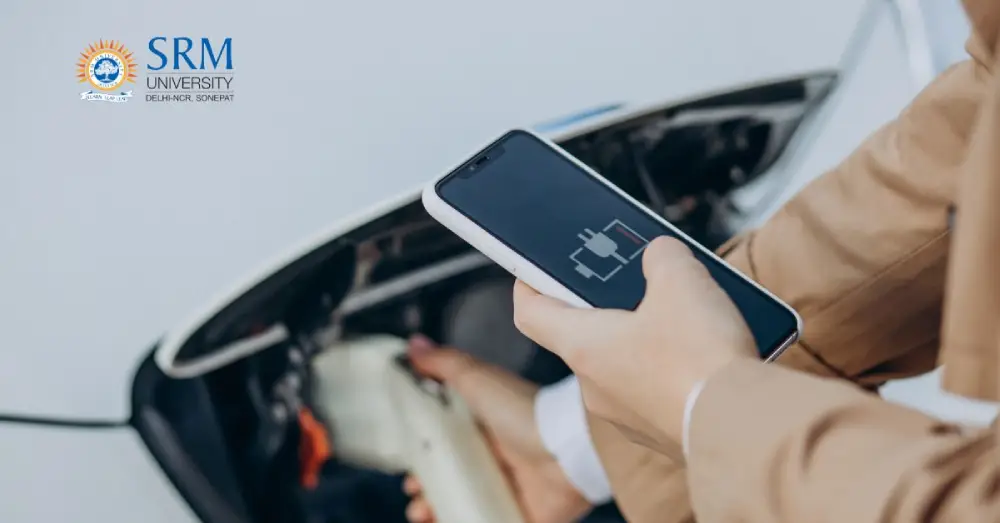
Top Colleges in India for Engineering 2025-26
Introduction
Electric vehicles are changing the way we travel. They reduce pollution, save fuel costs, and bring new technology into our lives. At the same time, battery technology is improving quickly, which makes EVs go faster, last longer, and charge faster.
For students who wish to join the top colleges in India for engineering, this field covers everything. Civil, electrical, electronics, and mechanical engineers all play a role in designing, building, and improving electric vehicles and batteries.
This blog explains the latest innovations, key statistics, challenges, and how the top colleges in India for engineering prepare students for the growing industry.
The Rise of Electric Vehicles: Key Statistics
The EV industry is growing fast all over the world, and in India:
- Global EV sales crossed 10 million in 2022
- India sold more than 1.5 million EVs in 2023, a 50% rise from the previous year
- The Indian government wishes to make 30% of the vehicles electric by the year 2030.
These numbers show why students at the top colleges in India for engineering are selecting EV and battery technology as their career options.
Why Electric Vehicles Need Engineering Innovations
Electric vehicles face several challenges:
- Batteries are expensive and can make up 40% of the car’s price
- People want cars that can travel long distances without frequent charging
- Quick-charging technology is required to save time
- Overheating and fire risks should be reduced.
Solving these problems is all about having knowledge in electronics, mechanical design, energy systems, and software. These are the required skills that are taught at the top colleges in India for engineering.
Key Innovations in Electric Vehicles
Some of the recent innovations are making EVs better every year:
- New chargers can charge a car in less than 30 minutes
- Engineers use carbon fibre and aluminium to make the vehicles lighter and energy-efficient
- Regenerative braking is a technology that converts braking energy into battery power
- Artificial intelligence helps to optimise the battery usage and motor efficiency.
Students learning at the top colleges in India for engineering should have the skills in AI, materials science, and power electronics to work on such innovations.
Advances in Battery Technology
Batteries are considered to be the heart of electric vehicles. Here are some major advancements:
Lithium-ion batteries
Most EVs use them as they store a lot of energy in small spaces.
Solid-state batteries
It is safe, light, and can store more energy than lithium-ion batteries.
Battery Swapping
Empty batteries can be replaced with charged ones within minutes.
Recycling technology
It is beneficial to recover lithium, cobalt, and nickel to reduce costs and waste.
Research on these topics is part of engineering programmes in many top colleges in India for engineering.
Role of Different Engineering Branches in EV Technology
Several engineering branches are valuable for EV development:
- Electrical engineering to design motors, circuits and charging systems
- Mechanical engineering works on vehicle design, aerodynamics, and materials
- Electronics engineering develops sensors, controllers, and battery management systems
- Computer science creates AI systems for autonomous driving and energy optimisation.
This is why top colleges in India for engineering offer multidisciplinary programmes to cover all the areas.
Why SRM University Delhi NCR Sonepat Leads the Way
SRM University Delhi NCR Sonepat is one of the top choices for students who wish to work in electric vehicles and battery technology. The university provides students with the skills, labs, and industry exposure needed to succeed in the fast-changing field.
Here is what makes SRM University Delhi NCR Sonepat stand out:
Modern EV labs
SRM University Delhi NCR Sonepat has advanced labs where students can learn about batteries, motors and charging systems. These labs help students to work on real machines, not just theory from books.
Special courses in trending fields
The university offers courses on electric mobility, battery design, power electronics, artificial intelligence for EVs, and energy storage systems. These courses teach the latest skills that companies wish to have.
Industry partnerships
SRM University Delhi NCR Sonepat works with companies like Tata Motors, Mahindra Electric, Ola Electric, and others. Students get internships, workshops, and placement opportunities with these industry leaders.
Hands-on Projects and Research
Students can join research projects on solid-state batteries, wireless charging, and autonomous electric vehicles. They can even build prototypes and test their ideas in labs.
Interdisciplinary learning
EV technology needs knowledge from mechanical, electrical, electronics, and computer science engineering. SRM University Delhi NCR Sonepat brings all these branches together to give students a complete learning experience.
Support for startups and innovation
SRMUH has incubation centres which help students to start their own EV-based companies. They provide candidates with mentorship, funding guidance, and lab access for new ideas.
With this ecosystem, SRM University Delhi NCR Sonepat can get the practical knowledge and confidence to work in exciting careers like EV design engineering, battery research, charging infrastructure, and energy management systems.
How Students Can Prepare for a Career in EV and Battery Technology
If you wish to work in this field, here is a simple plan for you:
- Study engineering at SRM University Delhi NCR Sonepat, one of the top colleges in India for engineering
- Take specialised courses in electric vehicles, power electronics, and battery design
- Do an internship with EV companies like Tata Motors, Ola Electric, and Ather Energy
- Stay updated on government EV polices and new technologies.
Career Opportunities in EV and Battery Technology
The EV industry comes up with the following job roles:
- EV design engineer
- Battery research specialist
- Charging infrastructure engineer
- Energy storage specialist
- Autonomous vehicle software engineer
Graduates from the top colleges in India for engineering often work in companies like Tesla, Mahindra Electric, Ola Electric, and global battery firms.
Future Trends in EV and Battery Technology
Some exciting trends shaping the future are:
- Cars can be charged while moving on wireless charging roads
- EVs to supply power back to the grid when required, with the help of Vehicle-to-Grid systems
- Hydrogen fuel cells are the best alternative to batteries for heavy vehicles like trucks and buses
- Nanotechnology in batteries is needed for higher energy storage and faster charging
The top colleges in India for engineering follow these topics in advanced engineering programmes.
Final Thoughts
Electric vehicles and battery technology are considered to be the future of transportation. With fast-growing sales and constant innovation, this field requires skilled engineers. Studying at the top colleges in India for engineering provides students with the knowledge and practical skills to lead in this growing industry.
FAQs
Why are electric vehicles important for the future?
The electric vehicles are useful to reduce pollution, save fuel costs, and help to fight climate change.
What is the biggest challenge for EVs today?
Battery cost, charging time, and range anxiety are some top challenges in the modern EVs of today.
How do the top colleges in India for engineering prepare students for EV careers?
The top colleges in India for engineering come up with specialised courses, labs, internships, and research projects in EV technology and battery systems.
What career options are available in the EV industry?
Students can work as an EV design engineer, battery specialist and energy systems researcher.
Source link



